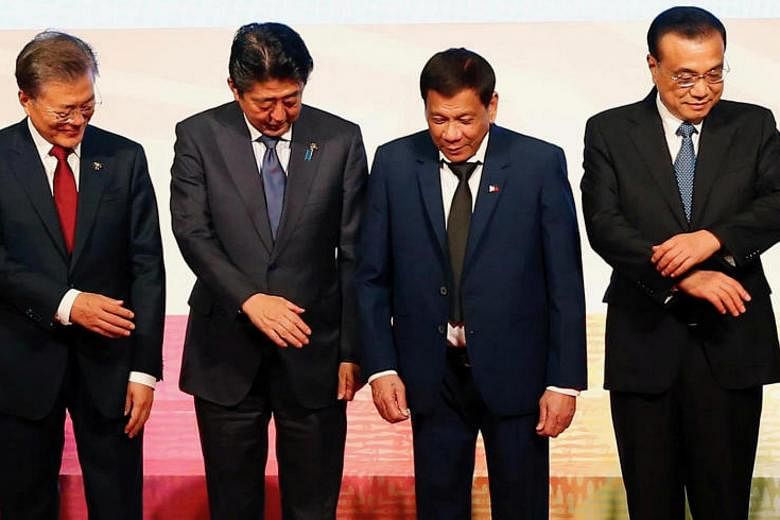TOKYO - Japan will host a trilateral summit with China and South Korea at the "earliest possible time", although not necessarily within this year, Chief Cabinet Secretary Yoshihide Suga said on Tuesday (Nov 14).
The high-level meeting involving the three countries' leaders was intended to be an annual affair when it began in 2008. After 2012, only one summit was held - in Seoul in 2015 - as relations frayed over such issues as World War II and territorial disputes.
Last year's meeting was cancelled amid political turmoil in South Korea, where then-President Park Geun Hye was impeached over a corruption scandal.
It is Japan's turn next to host the meeting, which involves its Prime Minister Shinzo Abe, Chinese Premier Li Keqiang and South Korean President Moon Jae In. Mr Abe and Mr Li had, when they met in Manila recently, vowed to work towards the early realisation of the summit.
Foreign Minister Taro Kono said on Monday (Nov 13) that Japan hopes to hold the summit "in January, if not in December, if possible". This, in effect, walks back on Tokyo's public goal to hold the summit by this year.
Mr Suga said on Tuesday that key political events in October - the Chinese Communist Party's 19th national party congress and a general election in Japan - meant that arrangements had to be put on hold for at least a month.
"Each country has its own diplomatic schedule that we will need to coordinate," he added.
South Korea's Mr Moon will visit Beijing next month for a bilateral summit with President Xi Jinping, it was announced over the weekend, after the leaders met in Vietnam.
Their meeting comes after China made nice with South Korea last month, after a year of harsh Chinese trade sanctions over the deployment of the American anti-missile system, the Terminal High Altitude Area Defence, or Thaad, on South Korean soil.
Mr Xi and Mr Moon agree on the need for sustained dialogue with North Korea to make the regime give up its ballistic missile and nuclear development programmes.
This is where they deviate from Mr Abe's view, which is the same as that of US President Donald Trump - that dialogue for the sake of dialogue is meaningless. Mr Abe and Mr Trump are close, having met six times and spoken on the phone 16 times this year.
"China and South Korea might have felt it necessary to hedge the US-Japan relationship," Keio University political scientist Yasushi Watanabe told The Straits Times.
It should be noted that Mr Moon, who took office only in May, has already received an invitation to visit Beijing. Mr Abe, on the other hand, has yet to visit China despite having been prime minister since 2012.
Nevertheless, Mr Abe and Mr Xi vowed to make a "fresh start" to bilateral ties on Saturday (Nov 11) when they met on the sidelines of the Asia Pacific Economic Cooperation summit in Danang, Vietnam.
Mr Suga said on Tuesday the two governments will work closely to realise the mutual visits next year, which marks the 40th anniversary of the Treaty of Peace and Friendship between China and Japan.
Amid the thawing relations, Japan-South Korea ties remain a sticking point. Mr Abe and Mr Moon did not meet for bilateral talks even though both attended summit meetings in Vietnam and the Philippines.
Tokyo was upset last week when Seoul invited a former "comfort woman" to a banquet for visiting US President Donald Trump and served prawns caught from waters around the Takeshima/Dokdo disputed islets.


